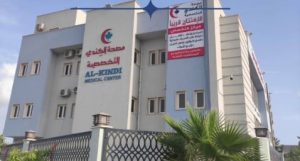By Sami Zaptia.

London, 24 September 2020:
On 6 September, a brand-new private sector clinic opened its doors in Tripoli; the Al-Kindi Clinic. The clinic will be a welcomed addition to Libya’s beleaguered health system – especially the free state health sector.
Opening a new business in Libya, just months after the end of the civil war and amidst a world pandemic, is a brave decision. Libya Herald, forever a champion of the private sector and free enterprise, was curious to understand the rationale for the clinic’s opening a new business at this time.
We were also keen to understand their vision and role for Libya’s private health sector viz-a-viz the state health sector.
With this in mind, we directed a few quickfire questions to the clinic’s administration, which they were happy to respond to:
Libya Herald: Who owns Al-Kindi Clinic? Is it owned by a private company or family?
Al-Kindi Clinic: The clinic is owned by a company called Al-Kindi Medical Corp. The corporation is made up of (Libyan) specialists based in Canada and the U.S.
The name Al-Kindi is in tribute to the great Abu Yusuf al-Kindi, an Arab-Muslim philosopher, mathematician, and physician, who played a significant role in shaping the field of medicine during his time. He pioneered the transfer of medical knowledge from Persian to Arabic.
Libya Herald: What encouraged you to open a clinic in Libya – especially at this difficult time?
Al-Kindi Clinic: Libya’s healthcare system has deteriorated significantly since the 2011 Libyan Civil War. Public hospitals have experienced massive resource shortages and have fallen behind the rest of the world when it comes to providing up-to-date care based on the latest knowledge and innovations. As such, the quality of healthcare Libyans receive in the past decade has declined and many have opted to seek treatment in other countries like Tunisia, at a much higher cost.
Al-Kindi hopes to provide evidence-based and best-practice care to all its patients. Despite the security and political challenges, the health of Libyans should not be sacrificed. We hope to provide the best quality care to our patients in a local setting.
The owners also believe that helping their fellow Libyans during these tough times is their duty and they hope to ‘‘pay forward’’ all the country has done for them in past.
Libya Herald: What were the difficulties you faced in opening the hospital?
Al-Kindi Clinic: There were a number of bureaucratic hurdles that had to be overcome, which were difficult to navigate in the current political climate. The emergence of COVID-19 also delayed the opening of the Al-Kindi and made it difficult for the owners to travel to Libya often, hindering progress. However, our on-site management and clinical team have worked tirelessly to ensure the vision of the clinic is achieved and we thank them for their hard work.
Libya Herald: Do you think the private sector can contribute the major share in providing healthcare in Libya?
Al-Kindi Clinic: We recognize that the private sector has stepped up massively post-2011 Civil War to provide healthcare to the Libyan people. However, we also acknowledge that there is more that can be done beyond just providing treatment to patients. While challenges remain in the public sector due to political disarray, the private sector can play a significant role in prevention and education.
The private sector can engage in a variety of community health initiatives that play a key role in preventing disease and injury, improving community health, and enhancing quality of life.
These campaigns enhance health and wellness by educating individuals on topics such as chronic diseases, mental illness, nutrition, obesity prevention, and oral health. These initiatives can help change the community’s attitudes, beliefs, and social norms to reduce risk factors and promote better health.
The private sector can also play a crucial role in collecting epidemiological data on the local communities that can be used to institute future health programs, policies and practices. At Al-Kindi, we have developed a family practice programme to be introduced to the public at a reasonable cost which will help promote and provide preventative health measures to all registered patients.
Libya Herald: Do you think the way forward in Libya is the private sector?
Al-Kindi Clinic: We believe in universal healthcare for all. In the future we believe Libya should have a strong public health system that is available to all residents and is supplemented by the private sector to ensure accessible and quality healthcare. Libya’s public and private sector should work together and strive to uphold the principles of other well-developed health systems like accessibility, fairness, equity, respect and dignity.
Libya Herald: What is the link in your logo with Canada?
Al-Kindi Clinic: The five owners are Canadian-trained physicians and the maple leaf in the logo is a tribute to the all the knowledge and expertise gained during their time in Canada that they hope to share with their staff and patients at Al-Kindi. In the future Al-Kindi plans to affiliate with Canadian institutes and become a satellite centre to one of the major university hospitals in Canada.









